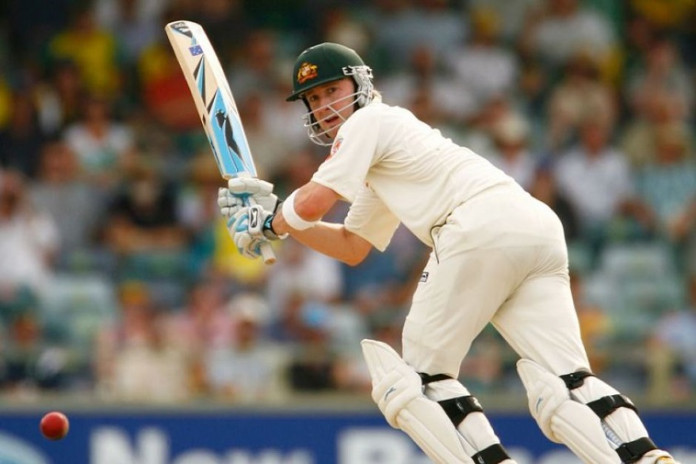The reception from a foreign crowd for Michael Clarke was long and strong. On his way out of Test cricket, The Oval rose to him and applauded him from its turf.
Not that he would have been the most popular visitor to tread that grass – his relationship with the home team grew spikier as it aged, and the response seemed warmer when Chris Rogers recognised England’s hospitality over his own long career. But generosity is a luxury easily afforded when a difficult opponent has ceded the conflict and leaves the arena with no eye to renewal.
So ended a career worth tribute for its basic markers alone: 115 Tests, 47 as captain, 28 centuries, a batting average so close to 50 as to make it petty to note the differential.
More than that, it was a career built in spite of physical constraint, with a fractional four Tests lost to injury despite back problems that persisted from adolescence. It was a captaincy tenure covering some of Australia’s most difficult years, with a fragile team unable to cover the loss of past greats.
Truth be told the team still fits that description, but not for want of effort from the man in charge. Perhaps he even tried too hard.
Because, despite the formality of respectful farewells, Clarke does not leave uniformly admired and loved. This applies to Australian supporters as much as others. Perhaps even more.
I count myself among those confused about what to make of Clarke: over these last weeks and months, it has felt like trying to untangle a dozen sets of headphones that have spent six months in a handbag. Divergent strands of sentiment and rationale, tensions competing in all directions, ends looping back to beginnings in a minor parody of the infinite.
There have been puff pieces and there have been hit pieces but it’s hard to appreciate detail when the picture is in monochrome.
Clarke’s play was never at issue. As a batsman he will go down as very good, with four great years.
His first was one of them, burning bright through 2004. High returns in 2006 and 2007 came from a handful of games, but as we ticked into 2008 and 2009 and Ricky Ponting started needing support, Clarke stepped up. Plenty of runs when India were pushing for a series win on tour. Tons away to West Indies and India, runs against New Zealand and a stack against South Africa when those teams visited.
Then away to England for his biggest Ashes: 83 at Cardiff, 136 at Lord’s, 103* at Birmingham, 93 at Leeds. It wasn’t enough: in the fifth Test England took the series while Clarke took three runs.
Then to his miraculous 2012: scores of 329*, 210, 259*, 230 and 106 in the space of 11 Tests. There’s nothing more to say.
The following year was still up there: 217 runs for one dismissal at Old Trafford would have dragged Australia back into that series if not for rain, and while he didn’t otherwise prosper in England, centuries at Brisbane and Adelaide to open the return bout ensured Australia would roll on to his greatest captaincy achievement with the 2013/14 whitewash.
Captains’ knocks
See how Michael Clarke’s batting compares to every other post-war Australian Test cricket captain, innings by innings.
At the other end of that summer he played his last objectively great innings, a fearsome assault from South Africa via Morne Morkel that left him with a broken shoulder, battling through unbeaten to 161, setting up his team for a series win at Cape Town sealed so memorably in the final moments by what would be Ryan Harris’ last Test delivery overseas.
Nine months later was Clarke’s last ton, his tribute to a lost team-mate in one of cricket’s most emotional weeks, scrapped out against limited Indian bowling but by a man emotionally and physically battered.
At worst you could claim he stayed seven Tests too long, a shorter lag by far than many a storied retiree.
Strangely, his most memorable moments may prove to come from his bowling. Six wickets within six overs in one mad Test in Mumbai that somehow ended in defeat, three wickets in an over to beat India at the last gasp in Sydney.
Afternoons when he was a golden-haired, golden-arm bringing the ‘Au’ out of Australia, Midas-touching batsmen’s feet into metal-cast solidity, proposing a ring of fielders, offering a dangled carrot, joining a union between bat and ball, imploring the umpire for a sovereign verdict. Guilty: edge.
It was that energy and vitality and vigour that characterised his early batting, like he couldn’t believe his luck in playing for Australia and wanted to throw himself into everything. The debut century in Bangalore, saluting in the baggy green, playing outrageous shots with the confidence of youth against all-time Indian spinners. His home debut century in the same style soon afterwards in Brisbane.
But as time went on, that joy faded from view. There is a cold and hard side to the way Clarke goes about things. Like the way Simon Katich and Andrew Symonds were pushed from the team after falling out with him. Like using public statements to manipulate selectors while trying to protect his place for the first Test in late 2014, or for the following World Cup. Like leaving the drudge work of one-day captaincy to George Bailey for two years, then expecting it back when the only tournament with any cachet came around.
It’s hard to trust someone so carefully media-managed. When he clapped Harris on the shoulder at the bowler’s farewell press conference and said, “He can coach at my academy any time”, it sounded like he was reading from notes.
But in some ways the coldness is manufactured. Antipathy to Clarke has taken different forms: early on, in a culture that insists its cricketers should be gruff and staunch, Clarke was the flashy kid with the earring and the tattoos and the underwear modelling contract.
It’s worth noting that Clarke is one of the first cricketers whose career spanned the era in which people’s opinions became so much easier to transmit and record. Those with the strongest views are more likely to comment and negativity is a stronger driver. The searchable written word has a potency not ascribed to the verbal. Online commentary can disproportionately influence our perception of broader discourse or sentiment.
Clarke seemed to respond to that strand of criticism. Especially as he prepared to take the captaincy, he tried to show a harder edge, to be a no-nonsense leader. But as a miller and an unfortunate donkey once learned, you can’t please everyone. In the end the act has gone too far. Clarke’s gruffness has recently been at its most exaggerated. Every press conference has been an exercise in latent hostility. Every question he’s thrown has been slapped to the floor.
Ask if this tour is important after losing three, and he’ll tell you the past is irrelevant. Ask if winning the last Test cheers him up, he’ll say it doesn’t matter if you lose the series. Ask what it means for his legacy, he’ll say he doesn’t care about his legacy. Ask about celebrating players who did well, he’ll say it doesn’t matter because the rest didn’t. Ask about anything with a wider context, he’ll say he’s only concerned with winning games of cricket. Asked if he was sad to retire, he said he couldn’t wait.
So why stay? Refusing to acknowledge that any series has a place in history, that history is important, that the playing of the game matters beyond the results. A laser-focus on winning is all that exists. But that leaves no appreciation for the game. It makes you want to ask him why we’re bothering. And why he’s bothering. And why we’re watching him bother.
By Clarke’s playbook, being a cricket professional has meant being the one person in the room who misses the entire point of why we love cricket. The romance of the sport appears and he slaps it with his shoe. Either he’s lying, saying what he thinks we want to hear, or he’s telling the truth and genuinely doesn’t care. I’m not sure which is worse.
So yes – personally, I’ve had difficulty warming to him due to his demeanour. But my response should also be questioned more deeply. Examined for context. And one factor that isn’t much acknowledged is how deeply affected Clarke must still be by the death of Phillip Hughes.
Many of us know what it’s like to lose someone at the peak of their vibrancy. The inexplicability and anger. The rage and disdain when dealing with people who don’t get it, the frustration trying to articulate it. You get possessive of your grief and the one you’re grieving for. You’re physically and mentally exhausted. A weight that crushes and lifts and returns. This case has only been nine months. Things like this don’t dissipate when the front pages stop running.
So, a shortness of temper? A lack of joy? Perhaps some sense of obligation to play in the games Hughes wanted to play? Perhaps a wrestle with resentment that the game Clarke loves also cost him a friend? Any of those would be fully understandable.
It’s hard to imagine it – all the fronting up, the scrutiny, the obligation, the fake smiles and back-slaps, the photos and autographs, the need for strangers to draw validation from you, the lack of time to yourself. The people writing profiles speculating about your thoughts and wants. The difficulty of a life on display. Perks, certainly, but it’s no wonder that Clarke has slumped towards retirement with relief.
Now he’ll have that time to take stock. Someone who’s been an international sportsman most of his adult life has to work out how to be an ordinary person. To be himself rather than part of a team. That’s less likely if he jumps straight in the glass elevator to the commentary box and never leaves the same safe celebrity bubble. The problem with being placed above others is you start to think you deserve it.
The key though is that none of this is real. This sport thing. Not really. We gather for the energy and the pageant, and they do matter, they mean something. But at the end of the match, when you sit in a grandstand deep into the evening, it stops.
Having watched it dozens of times now, it’s amazing how quickly these heaving crucibles of humanity and aspiration and hope and pressure sink back into sleep. The crowd streams away, the circus rolls out of town, the cleaners sweep through like distant colourful beetles and the place is left clear and vacant and reborn. The stadium reverts to potential, a faint energy where people could gather but haven’t.
There is a sadness, a kind of nostalgia, but also a gentleness, a kind of peace. It’s probably a bit like retirement.
Late on the night that Australia’s captain packed it in, The Oval was very quiet. A couple of muttering security guards lost in the shadows. A soft and cool English summer evening layered over it like a scarf. The Pavilion on the far side of the grass lit up like fairyland, rich yellows in distant rooms, the hiss of the sprinklers popping from the grass like shy nocturnal creatures, and above it all the beacons of an aeroplane, both close and impossibly high. This is what was left. After the tumult is done, everyone goes home. Maybe Michael Clarke is on his way.


















